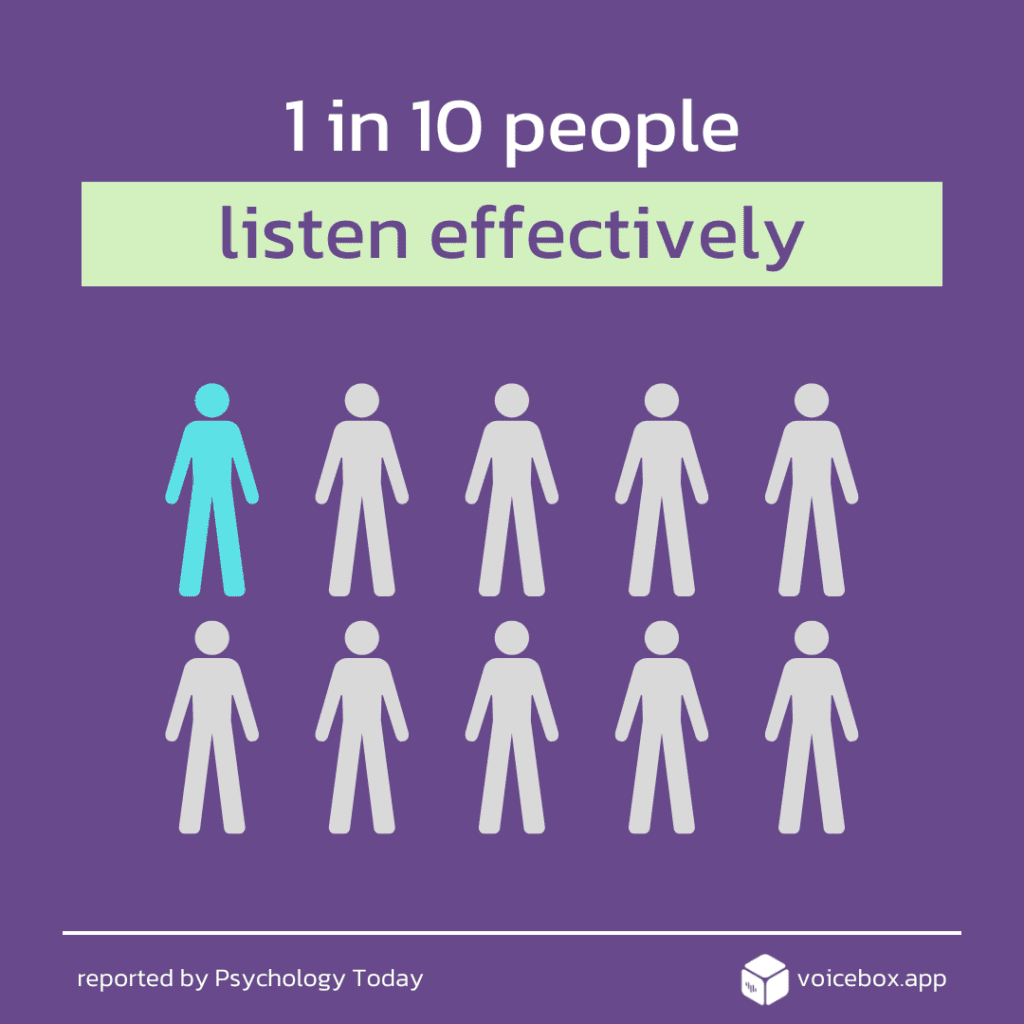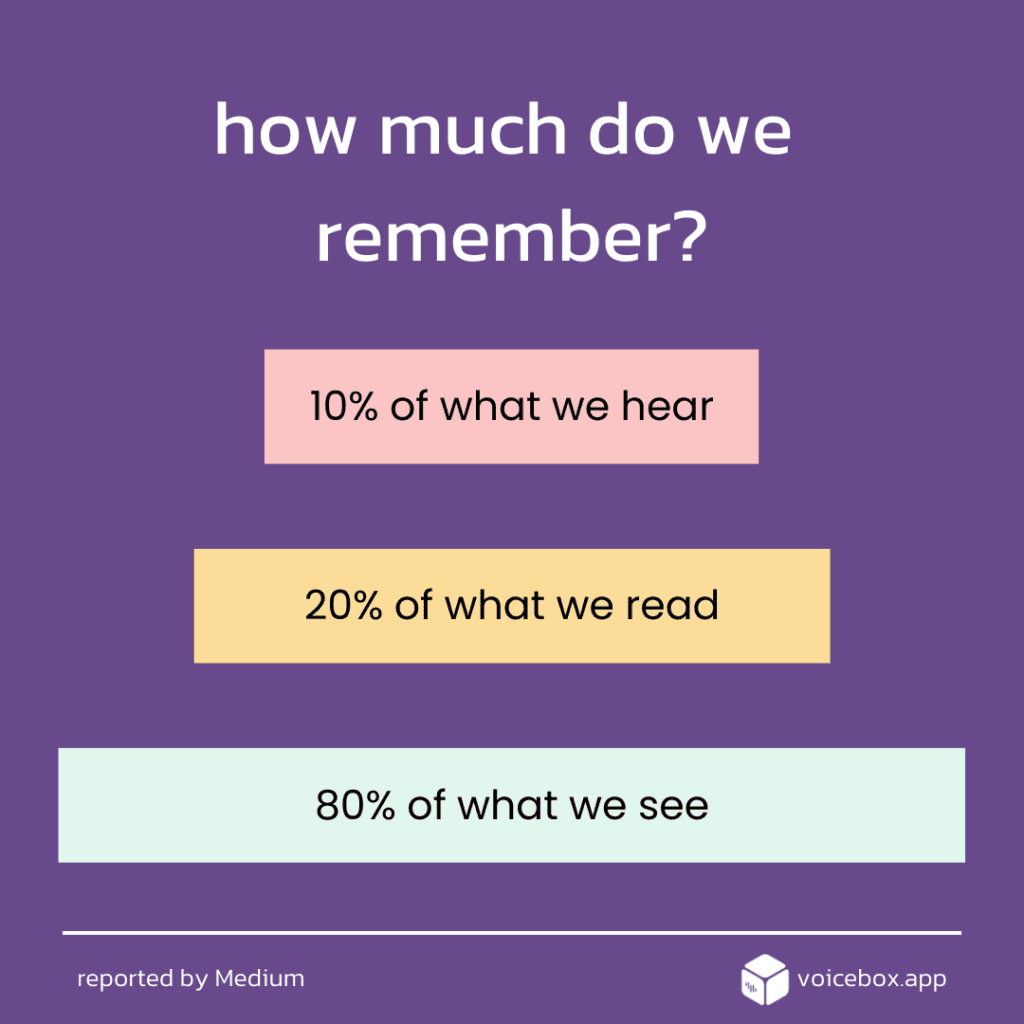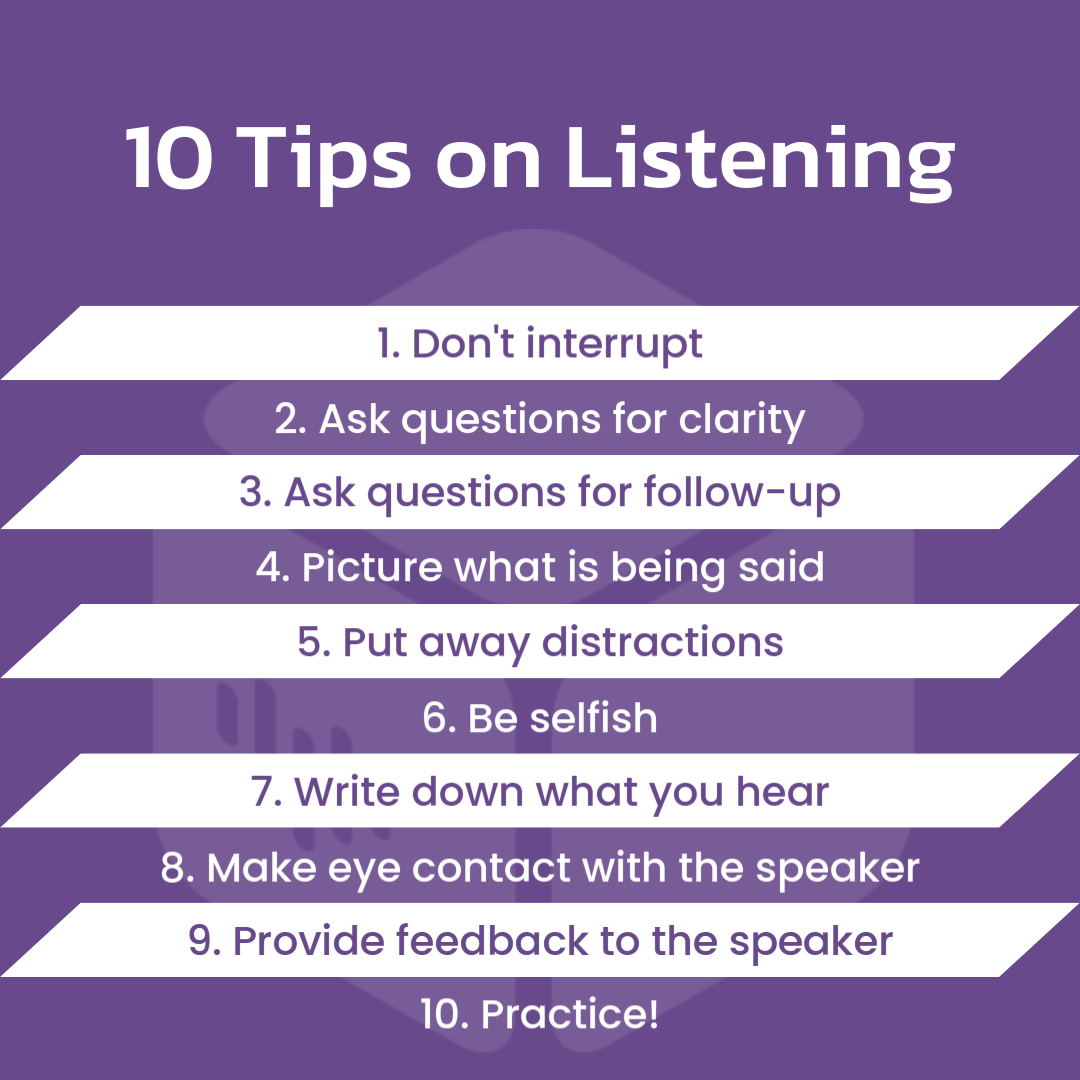Listen to the blog post here.
Sherlock Holmes once recounted to Dr. Watson, “You see, but you do not observe.” To illustrate the difference between seeing and observing, the sleuth asked his good friend how many times he had seen a particular staircase, to which Dr. Watson replied hundreds of times. But when asked how many steps the staircase had, Dr. Watson had no idea. Sherlock of course knew there were 17. This example demonstrated how even though both of their eyes worked just fine, the connection between their sight and minds was different. Observation is a skill in its own right and one that Sherlock had mastered.
This distinction between seeing and observing can also be applied to our sense of sound. That is, the difference between hearing and listening. Most people can hear the sounds around them just fine, but the ear-mind connection that allows the person to interpret sounds is a skill. It’s the reason why two people who hear the same message can interpret it in two different ways. They hear the same thing but they listen differently.
However, listening is becoming a lost art. A Psychology Today article reports that only 10% of people listen effectively. Sound touches nearly every aspect of our lives. From lectures to private conversations with a loved one, from a honking horn on the road to the rumbling of thunder, the utilities of listening abound. So listen up! Because hearing this post may not be enough.

How Listening Benefits You
As mentioned above, listening has some immediate use cases by virtue of interpreting and understanding the sounds around you. Beyond that, effective listening has a number of benefits that make it a skill worth practicing. While it can be easy or even tempting to tune people out, here are a few reasons why an attentive ear is gold.
Benefit 1: Listening Builds Stronger Relationships
As Dr. Jennifer Rhodes puts it, “Listening is the way you actually connect with people.” To truly listen is to understand how someone is feeling and what they’re going through, which can inform a more appropriate response. A simple example is remembering someone’s birthday. Take it a step further by remembering what they said they wanted and gifting them that.
On the other hand, not listening can break apart relationships. As an example, marriage.com ranks lack of communication as the third most common reason for divorce.
Benefit 2: Listening Helps You Learn
Effective listening goes hand in hand with remembering. As reported by Medium, we only remember 10% of what we hear, which is the lowest of the various ways we gather information (20% of what we read, 80% of what we see). Think about how difficult it can be to remember that thing your spouse told you is happening next week. You know…that thing. Or how remembering your grocery list is a lot easier when you write it down, even if you forget the list at home.
The reason for this weakness isn’t entirely clear, but research from the University of Iowa indicates that the way our brains process sound into memory differs from how we process sight and touch. So while Dr. Watson may have had trouble remembering the exact count of stairs because of his lack of observation, people may have even more difficulty remembering information when we don’t take the due diligence to attentively listen.
Benefit 3: Listening Helps You Communicate Better
Communication isn’t just about the message you want to get across, but how your message relates to the messages of others. Our thoughts and feelings are not in a vacuum. They intertwine with the thoughts and feelings of everyone else in our lives. Being able to listen more effectively will boost your understanding of those thoughts and feelings. That empathy and awareness can help you communicate more properly, whether that be the message itself or how you deliver it. In short, in order to speak better, you have to listen better.
Benefit 4: Listening Makes You More Likable
Generally speaking, people like attention. Look no further for proof of this than social media, where people vie for the attention of someone or another, from loved ones to strangers. Attention shows others that you’re interested in their experiences and opinions, and that tends to satisfy people.
On the flip side, ignoring or interrupting others is a surefire way to make someone think you don’t care what they have to say. Another Psychology Today article cites research that examines how being ignored hurts a person’s self-esteem and makes them feel not worthy of attention.
Why is Listening so Difficult?
Given the significance of good listening, why then are so few people effective listeners? There are a variety of reasons for why this is the case, but they can be grouped into one of these three:
Reason 1: Waiting to Talk
This tends to be the case in two situations:
- You have your own agenda for the conversation, or
- You have made up your mind prior to, or in the middle of, hearing what the other person is saying.
In the former case, perhaps you’re engaged in a conversation where you’re hoping to gain something out of it (e.g. asking someone out on a date), you want to convince someone of something (e.g. a political debate over social media), or you want to focus on a certain aspect of a topic while ignoring other ones.
The latter case is more rooted in the need to have your opinion heard. While not inherently a flaw, it becomes a problem when it results from exercising power over another or always needing to be right. In all these instances, you’re physically present in the conversation, but you jump at the chance to say what you came to say instead of synthesizing what you’ve heard to recalibrate what you know.
Some signs may tell you that you’re not listening as much as you are just waiting to talk. The biggest one is interrupting the other person. A study by George Washington University found that in a three-minute conversation, a person will be interrupted around two times.
A second tell is if you catch yourself passing judgment on the speaker, whether that means thinking they’re wrong, stupid, or otherwise. Even if you are ultimately right, passing judgment in the middle of a conversation can lead to you blocking out the rest of what they have to say. This may cause you to either misunderstand their point or their reasoning.
Reason 2: Distractions
With so much on our minds, it’s no surprise that we may not fully listen to what is being said. These distractions can be self-inflicted or brought on by extenuating circumstances.
Extenuating circumstances could be something as unexpected as a doorbell ring to a thought that crosses your mind for a brief instance. Since these are more difficult to control, the least we can do is cut out the self-inflicted ones.
Self-inflicted distractions include anything you do to pull your attention away from the person speaking. The most common example nowadays is grabbing your phone while another is talking, an action so rampant nowadays that it has its own term: “phubbing”. Another self-inflicted distraction is multi-tasking. The Cleveland Clinic reports a study that found that only 2.5% of people are able to multitask effectively; another study by Fuze found that 92% of people admit to multitasking during virtual meetings at work.
Multitasking isn’t inherently a bad thing, nor is all multitasking created equal. For example, people sing in the shower, and perhaps the worst outcome is a bigger water bill. When it comes to conversation, however, multitasking makes attentive listening quite difficult. Depending on the nature of what you’re listening to and whether it’s a one-way delivery or two-way conversation, be judicious in doing other tasks while you’re listening.
Reason 3: Not Interested
At the end of the day, not everyone is interested in everything. For example, the stereotypical boring lecturer talking about grass will find it much more difficult to hold people’s attention.
Fatigue also feeds low intrigue. After a long day at work, family members may find it difficult to pay attention to another talking about their day.
Signs that you’re not interested in what the other person has to say may include interrupting them to pulling out your phone while talking. A lack of interest can also be apparent when you feel your mind wandering or if you wouldn’t be able to summarize what has just been said.

How to Improve Your Listening
Our five senses are on autopilot. In other words, we can see, hear, smell, taste, and touch things without needing to think about it, in much the same way we breathe without a thought. The first key to improving your listening skill is understanding that simple fact.
The steps that follow all have to do with more actively hearing the sounds around us as opposed to letting our ears hear on autopilot. Active hearing is just a fancy way of saying listening. Here are some ways to do that when it comes to listening to others:
- Don’t interrupt. It should probably go without saying, but interrupting someone prevents you from hearing the full message. This impacts what you ultimately would have said in response. I can’t count the number of times in a presentation when I've seen someone interrupt with a comment or question, only for the presenter to respond, “That’s coming up”. Of course, not interrupting doesn’t mean sitting there stewing over what you plan to say, which leads to the second point.
- Ask questions for clarity. Even if you think you’ve understood what’s been said, asking questions for clarity will help solidify what you’ve heard. It will also clear up any possible misinterpretations or miscommunications on the part of the speaker. Both those things can save a lot of problems in their own right. Keep in mind to wait for the right time to ask a question as opposed to the first moment it pops in your head.
- Ask questions for follow-up. Questions of clarity typically involve the speaker repeating or rephrasing what they’ve said. Follow-up questions progress the conversation by making both you and the speaker think critically about where to go from here. But take care to not ask a question that comes across as passing judgment, as this can sour the conversation instead of progressing it.
- Picture what is being said. Involving our minds and imaginations into what we’re hearing is perhaps the most active way to stimulate the processing of information. While not the same as seeing actual images, knowing that our brains process visual information best is an important tool in our listening belt.
- Put away distractions. Again, not all conversations are the same, nor is your relationship with every speaker the same. Know when it’s okay to multitask while listening versus when you should give your undivided attention to the speaker. Listening to a podcast while driving? No problem. Listening to your mother about almost anything? Give her your all.
- Be selfish. It’s an odd piece of advice, but keeping in mind what benefit you get out of the conversation can vastly boost your want to listen. This could mean that you’re in a conversation that directly impacts you with some benefit, such as a job interview. It could also mean that the speaker is someone important to you, so listening to them helps build your relationship with them. The point is that listening doesn’t just benefit the speaker. It helps you too.
- Write things down. As mentioned earlier, hearing alone is the worst way for us to remember things. But when we pair hearing with writing, the information we hear gets processed in two different ways. This technique especially helps in more formal settings and long-form engagements like lectures, presentations, and podcasts.
- Make eye contact. Coincidentally, sight plays a huge role in unlocking the power of our ears. Eye contact of course only applies when the speaker can be seen, but it makes a world of difference. Engaging the speaker with your eyes not only keeps you focused on their words, but it shows the speaker you’re interested as well.
- Provide feedback. This also applies to when you’re with the speaker. It can include simple things like nodding, facial expressions to match the face or tone of the speaker, and even small asides like “I understand” or “That’s rough”. But to do these things meaningfully requires focusing on what is being said. Otherwise, you risk sounding like you’re dismissing the speaker.
- Practice! Like any skill, you improve your listening the more you actively do it. By practicing the above steps, you can learn how to ask the right questions, how to provide meaningful feedback, and how to turn away from other distractions.

Listening on Voicebox
To that final point, Voicebox offers the perfect place to practice listening. It’s not just because it’s an audio-based app, but the short-form nature means you’ll hear a variety of voices on a variety of subjects. That variety means you'll likely hear a topic of interest to you. The short-form nature will constantly test your mind with processing digestible chunks.
As the old cliché goes, we have two barriers in front of our tongue, our lips and teeth, but none blocking our ears. This means that we should spend more time and energy listening than we do speaking. As the founder of an app that’s all about getting people to chat up a storm, it’s no secret that I love encouraging people to speak. However, being heard isn’t a solo act. It involves someone saying something, but it also necessitates that someone listen.
I want everyone to value their own voice. That’s such a crucial aspect to Voicebox. Hand in hand with that goal is valuing the voices of others. When people put themselves on the line by sharing their voice with the world, that courage should be met with applause. And what better way to give a standing ovation than to intently listen to what people are saying? For those of you listening to this post, allow me to give it a little test drive. How many steps did Sherlock Holmes say made up that staircase?
Sunday Blog is a series where we discuss the many facets and functions of the human voice.

